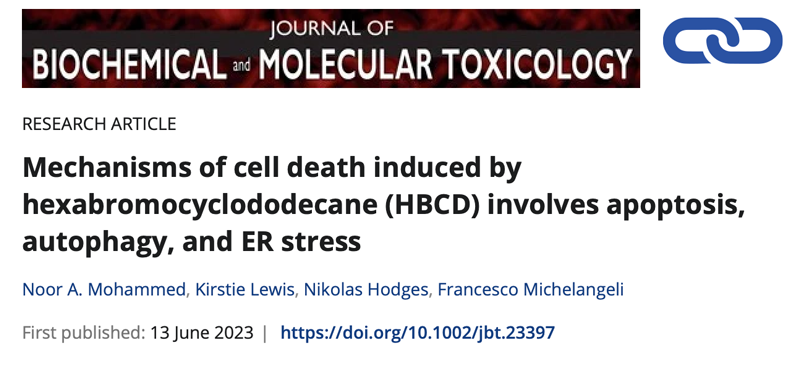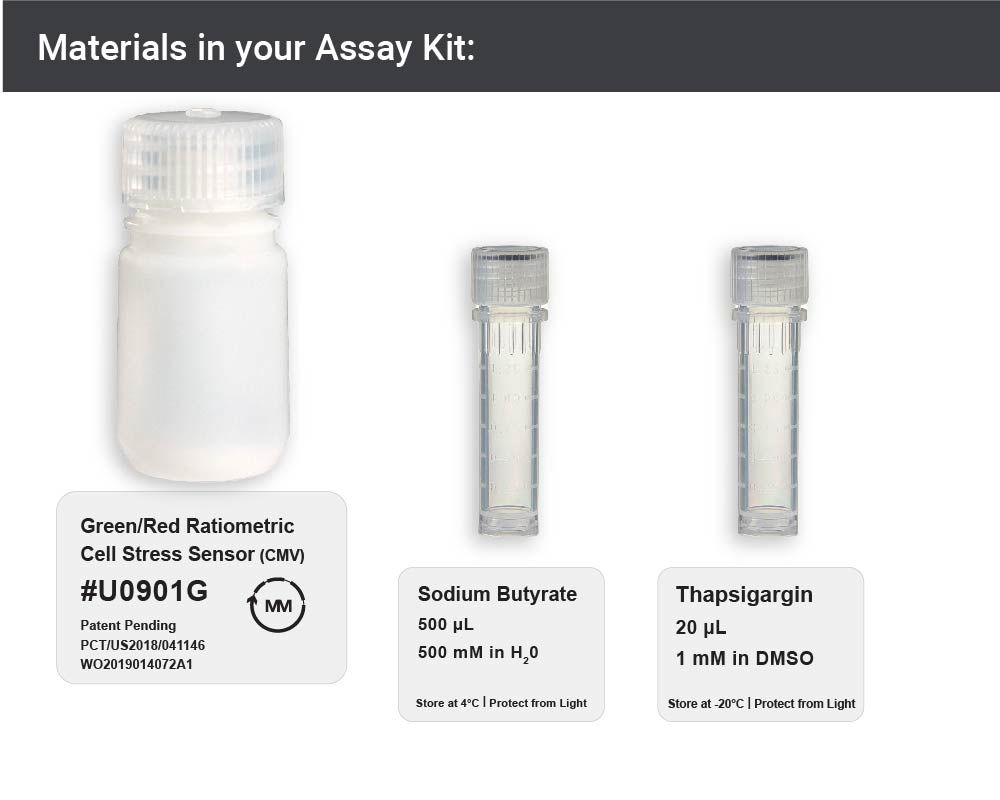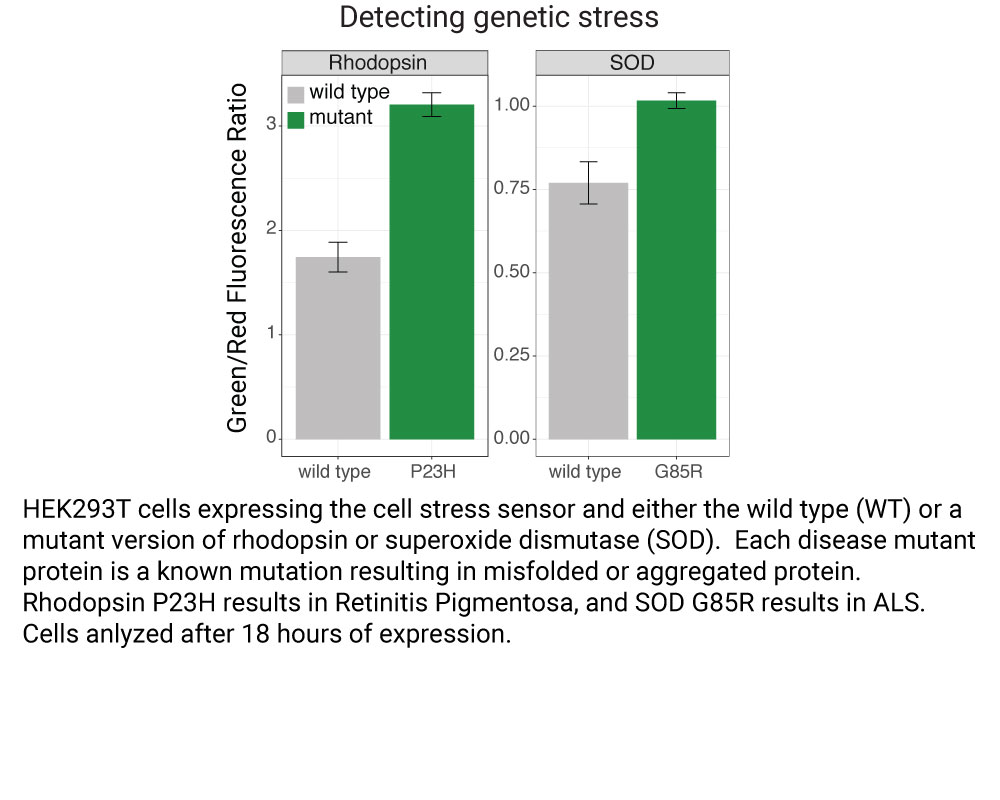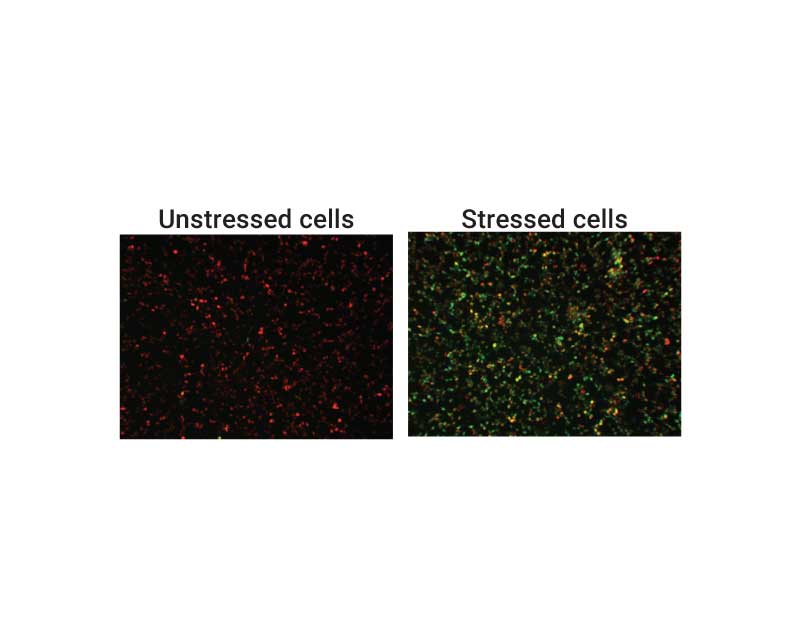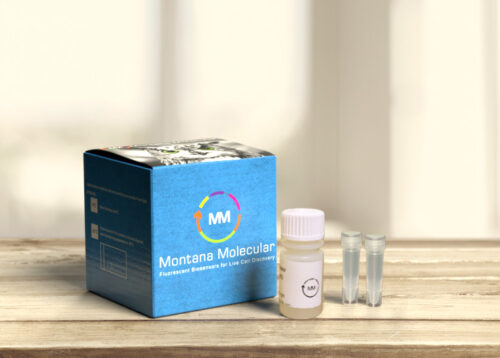Green/Red Ratiometric Cell Stress Assay Kit (U0901G)
Bright green fluorescent ER stress assay to detect the onset and reversal of chemical or genetic stress responses and UPR. CMV promoter.
A new version of this sensor is now available, product #U0921G. The sensor mechanism is the same, but the updated sensor is packaged in our new Big Sky BacMam vector and constitutively expresses the brighter Montana Paintbrush RFP for improved plate reader compatibility. Please reach out to us with any questions or for a quote for #U0901G.
The ER stress sensor is a genetically-encoded fluorescent biosensor that contains a constitutively expressed red fluorescent protein and produces very bright green fluorescence when the cell endures endoplasmic reticulum (ER-mediated) stress or undergoes the unfolded protein response (UPR). Importantly, both the red and green fluorescent signals are nuclear localized for simple cell segmentation and image analysis. This sensor is based on the XBP1 mRNA which is spliced by the IRE1 protein during ER stress [Iwawaki et al. 2003]. Additional details may be found on the Cell Stress Assay page.
Materials in the Kit:
• Green/Red Ratiometric Cell Stress sensor BacMam
• Sodium Butyrate, 500 mM in H2O
• Thapsigargin (positive control)
Additional information
| Protocol for Use | https://montanamolecular.com/cell-stress-assay-kit/ratiometric-cell-stress-sensor-protocol/ |
|---|---|
| Shipping | We strive for prompt delivery of each order, so we ship by FedEx 2-day service in lightweight, sturdy, and reusable/biodegradable packaging with an insulated cooler and moisture-resistant refrigerant gel packs. Shipping days are Mon-Wed so product does not sit in transit over the weekend. Web store ships to US & Canada only, contact sales for other locations. |
| MSDS | |
| More Info | |
| Scientific Publications | |
| Kit Volume | 10mL, 30mL, 60mL |
| Terms of Sale |
- C. Byrnes, et al. 1-Deoxysphingolipids Require Very-Long-Chain Ceramide Synthesis to Induce ER Stress and Neurotoxicity. bioRxiv. December 2025.
- D. Wang, et al. Azoramide attenuates thapsigargin-induced ER stress and cell death in human SH-SY5Y cells via maintaining intracellular calcium homeostasis. European Journal of Pharmacology. November 2025.
- M. Pathak & A. Spradling. Mouse germline cysts contain a fusome that mediates oocyte development. bioRxiv. September 2025.
- G. Roy, et al. VDAC1 is a target for pharmacologically induced insulin hypersecretion in β cells. Cell Reports. June 2025.
- N. Shimizu, et al. Mechanistic Insights into the Apoptosis of Cancer Cells Induced by a Kinase-Responsive Peptide Amphiphile. Chemistry Europe. January 2025.
- G. Roy, et al. Target deconvolution of an insulin hypersecretion-inducer acting through VDAC1 with a distinct transcriptomic signature in beta-cells. bioRxiv. December 2024.
- B. Dhayalan, et al. Synthetic Studies of the Mutant Proinsulin Syndrome Demonstrate Correlation Between Folding Efficiency and Age of Diabetes Onset. International Journal of Peptide Research and Therapeutics. November 2024.
- N. Borkar, et al. Nicotine-induced ER Stress and ASM Cell Proliferation is Mediated by α7nAChR and Chaperones-RIC-3 and TMEM35. American Journal of Respiratory Cell and Molecular Biology. September 2024.
- M. Ho, et al. Molecular mechanisms involved in alcohol craving, IRF3, and endoplasmic reticulum stress: a multi-omics study. Nature Translational Psychiatry. March 2024.
- L. Scheherazade Milane. Combination Organelle Mitochondrial Endoplasmic Reticulum Therapy (COMET) for Multidrug Resistant Breast Cancer. Journal of Controlled Release. October 2023.
- S. Sanchez-Martinez, et al. Labile assembly of a tardigrade protein induces biostasis. bioRxiv. July 2023.
- N. Mohammed, et al. Mechanisms of cell death induced by hexabromocyclododecane (HBCD) involves apoptosis, autophagy, and ER stress. Journal of Biochemical and Molecular Toxicology. June 2023.
- K. Harlen, et al. Live-Cell Assays for Cell Stress Responses Reveal New Patterns of Cell Signaling Caused by Mutations in Rhodopsin, α-Synuclein and TDP-43 Frontiers Cellular Neuroscience. December 2019.
- K. Harlen, et al. Live-cell biosensors reveal novel insight into neurotoxic and cardiotoxic compound mediated cellular stress response. Journal of Pharmacological and Toxicological Methods. October 2019.

